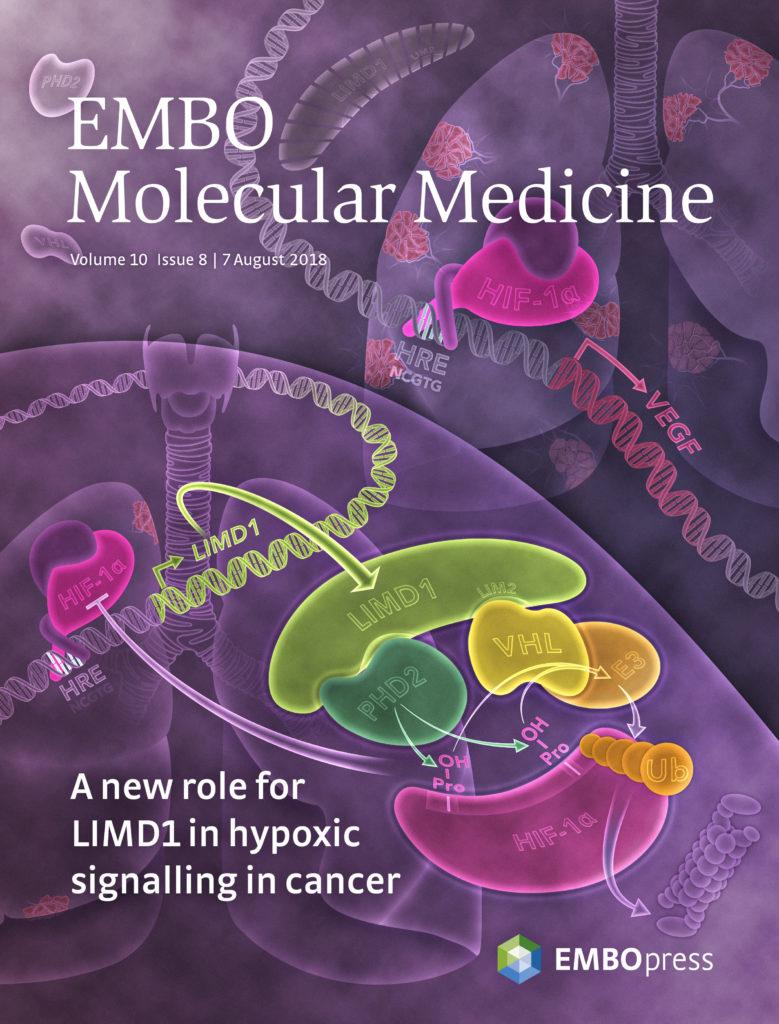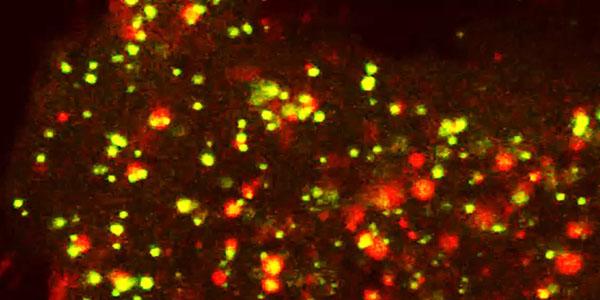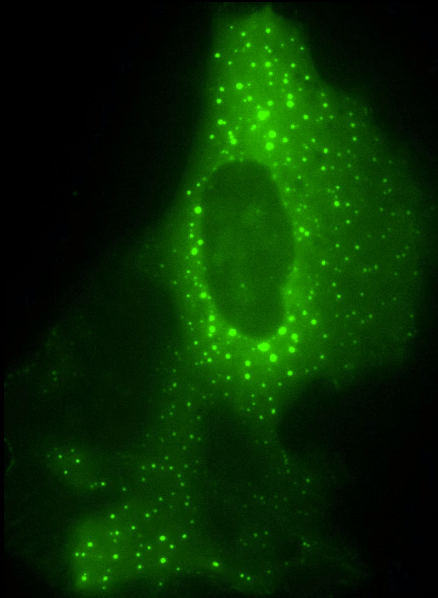
Professor Tyson V. Sharp
BSc (Hons), PhD
Professor of Cellular and Molecular Biology
Centre Lead, Group Leader, Research Theme Lead
TwitterResearch Focus
My research is driven by a commitment to unravelling the complexities of cancer biology, with a particular emphasis on the molecular mechanisms that underpin the disease's development and progression. At the heart of my work is the exploration of LIMD1, a protein that plays a pivotal role in cell cycle regulation, tumour suppression, and the cellular response to hypoxia. By integrating studies on molecular virology, immuno-oncology, microRNA biology, and the development of innovative preclinical models, my research aims to identify novel therapeutic targets and strategies to combat cancer. This multidisciplinary approach not only seeks to advance our understanding of cancer but also to translate these findings into meaningful clinical applications, ultimately improving patient outcomes.
Key Publications
Targeted therapy for LIMD1-deficient non-small cell lung cancer subtypes. Cell Death Dis (2021) 12, 1075. PMID: 34764236
A HIF-LIMD1 negative feedback mechanism mitigates the pro-tumorigenic effects of hypoxia. EMBO Mol Med (2018) PMID: 29930174
Argonaute Utilization for miRNA Silencing Is Determined by Phosphorylation-Dependent Recruitment of LIM-Domain-Containing Proteins. Cell Rep (2017) 20(1):173-87. PMID: 28683311
The LIMD1 protein bridges an association between the prolyl hydroxylases and VHL to repress HIF-1 activity. Nat Cell Biol (2012) 14(2):201-8. PMID: 22286099
LIM-domain proteins, LIMD1, Ajuba, and WTIP are required for microRNA-mediated gene silencing. Proc Natl Acad Sci U S A (2010) 107(28):12499-504. PMID: 20616046
Major Funding
- 2024–2027 – Barts Charity grant, 'Deciphering the Mechanisms Governing Response to Immune Checkpoint Blockade in BRCA mutant Ovarian Cancer', £271,675
- 2023–2026 - Prostate Cancer UK Research Innovation Award, 'Understanding and exploiting the PTEN driven alternative splicing programme in hypoxic prostate tumours', £275,357
- 2023–2026 – Breast Cancer Now project grant, 'Defining a new breast cancer tumour suppressor gene', £242,000
- 2022-2024 - Rosetrees Trust Intermediate Research Project Award, £51,288
- 2022-onwards - BBSRC, ALERT-Equipment bid Award, 'A confocal microscope for multidisciplinary dynamic studies of complex biological systems', £390,834, Co-PI
- 2022-2024 - Barts Charity, Grant Seed Award, 'Development of a new and more disease relevant mouse lung cancer model', £48,256, PI
- 2021-2024 - BBSRC Project Grant, 'The Lexicon of miRISC: Deconstructing the functional complexity of the miRNA induced silencing complex', £633,000
Other Activities
- Editorial Board Membership- Nature Press: Scientific Reports; Frontiers in Cell and Developmental Biology (Associate Editor); Frontiers in Oncology (Associate Editor); Cells (Topic Editor)
- Reviewer for the following Journals: Oncogene, RNA, Nature Press, Journal of Molecular Medicine, PLoS Press, Nucleic Acids Research
Research

The current research projects within my group originate from our initial identification of LIMD1 as a specific pRB (retinoblastoma protein) binding partner (Sharp TV et al PNAS 2004). LIMD1 is on chromosome 3p21.3, often deleted in epithelial cancers. We have also shown that LIMD1 is a bona fide lung cancer tumour suppressor (Sharp TV et al PNAS 2008) and also that loss of LIMD1 expression correlates with poor patient prognosis and decreased survival with respect to breast cancer (Spendlove et al 2008).
More recently we have demonstrated the key role LIMD1 has as a scaffold protein in regulating the hypoxic response (how cells sense and respond to low levels of oxygen), through our seminal discovery of LIMD1 binding the PHD2, VHL and HIF proteins (Nature Cell Biology 2012). Furthermore, we have demonstrated that disruption of this complex and its regulation contribute to the development of lung cancer with very poor prognosis (EMBO MM 2018).
The full molecular characterization of this novel tumour suppressor is therefore the main focus of my group’s continued research. By understanding the function(s) of LIMD1 and indeed its family member proteins (Ajuba and WTIP); we can begin to understand how loss of this important tumour suppressor(s) contributes to disease pathogenesis and specifically tumorigenesis. We have also iniated new studies into targeting LIMD1 negative cancers and also the interplay of LIMD1 and LIM-domain protein with Immune-Oncology.
We are particularly focused on pancreatic, lung, prostate and ovarian cancers as areas of high unmet clinical need, working closely with colleagues in oncology at Barts Cancer Centre to translate discoveries into patient benefit.
PhD Studentships within the Sharp Group
Candidates interested in joining the lab to work in this research area can contact Professor Sharp by sending an email to t.sharp@qmul.ac.uk.
Currently positions are only available to self-funded students.


Other Activities
Editorial Board Membership:
- Nature Press: Scientific Reports.
- Frontiers in Cell and Developmental Biology (Associate Editor)
- Frontiers in Oncology (Associate Editor)
- Cells (Topic Editor)
Reviewer for the following Journals:
- Oncogene
- RNA
- Nature Press
- Journal of Molecular Medicine
- PLoS Press
- Nucleic Acids Research
Reviewer for the following Funding Bodies:
- MRC
- BBSRC
- CRUK
- British Lung Foundation
- L’OREAL-UNESCO for Women in Science
- Worldwide Cancer Research
- The Netherlands Organisation for Scientific Research
Member of:
- The Biochemical Society
- The British Lung Foundation
- The British Thoracic Society
- The British Genetics Society
- MRC Peer Review College
Major Funding
- 2024–2027 – Barts Charity grant, 'Deciphering the Mechanisms Governing Response to Immune Checkpoint Blockade in BRCA mutant Ovarian Cancer', £271,675
- 2023–2026 – Prostate Cancer UK Research Innovation Award, 'Understanding and exploiting the PTEN driven alternative splicing programme in hypoxic prostate tumours', £275,357
- 2023–2026 – Breast Cancer Now project grant, 'Defining a new breast cancer tumour suppressor gene', £242,000
- 2022–2024 - Rosetrees Trust Intermediate Research Project Award, £51,288
- 2022–onwards - BBSRC, ALERT-Equipment bid Award, ‘A confocal microscope for multidisciplinary dynamic studies of complex biological systems’, £390,834, Co-PI
- 2022–2024 - Barts Charity, Grant Seed Award, ‘Development of a new and more disease relevant mouse lung cancer model,’ £48,256, PI
- 2021–2024- BBSRC Project Grant, ‘The Lexicon of miRISC: Deconstructing the functional complexity of the miRNA induced silencing complex,’ £633,000
- 2020 – BBSRC, Super-Resolution Microscopy of live cells in 3D, £369,201
- 2017–2022 - CRUK Accelerator Award Committee, ‘Understanding the mechanisms and benefit risk of aspirin chemoprevention of cancer through population research - Aspirin for Cancer Prevention Collaboration (AfCPC),’ £4,000,000, Co-PI
- 2017–2021- Barts Charity, Novel Targeted Therapy for Renal Cancer, £337,435
- 2016–2021- Medical Research Council, Unravelling the Mechanism of the Lung Tumour Suppressor LIMD1 from Cellular Metabolism to Malignant Transformation, £380,206
- 2014–2017- BBSRC Project Grant, ‘Characterisation of a new mechanism of regulation for HIF1 and the hypoxic response,’ £335,264 PI
- 2014–2017- CRUK PhD Studentship Award, ‘CRISPR-Cas9 genomic screen to identify novel hypoxic regulator for targeted therapy,’ worth £110,000
- 2014–2015- Queen Mary Innovations/MRC Target Validation Funding, ‘LIMD1 loss as a target for Synthetic Lethality Drug Screen,’ £50,000 PI
- 2013–2016- CRUK Clinical Training Fellowship Award, ‘The role of LIMD1 loss in the renal cancer stem cell aetiology,’ worth £250,000
- 2013–2016- MRC PhD Studentship Award, ‘Investigating the role of LIMD1 loss in the aetiology of lung cancer stem cells: a focus on metabolism,’ worth £76,200
- 2013–2015- BBSRC Taiwan Partnering Award Two Years, PI UK International Partnership towards the advancement and discovery of novel microRNA species and regulatory proteins in stem cell biology (Ref: BB/L003945/1), £25,000
- 2012–2015- BBSRC, The new LAW of microRNA-mediated gene silencing, £461,924.40
- 2012–2015- Barts Charity Project Grant, 'Induced Pluripotent Stem Cells as a platform for the study of patient-specific cellular biochemistry and assessment of personalised medicines in cancer, cardiac and endocrinological diseases,' £400,000 Co-PI
- 2012–2015- CRUK Project Grant, ‘Role of LIMD1 loss in lung cancer stem cell biology,’ £240,000 PI
- 2012–2013- BBSRC Follow on Funding (FoF), ‘Pre-commercialisation validation of Stem Cell Generator as a highly efficient single transfection iPSC reprogramming vector,’ £150,000, PI
- 2011–2014- BBSRC Project Grant, ‘The new LAW of microRNA-mediated gene silencing,’ £580,000 PI
- 2008–2011- BBSRC New Investigator Award, Spatio-temporal structural and functional studies into the novel interaction between LIMD1 and clathrin heavy chain proteins, £328,000
Recent Publications
Abstract 1339: Targeting specific extracellular matrix proteins to reactivate T cell trafficking in triple-negative breast cancer Gauthier V, Tyler E, Liu Y et al. Cancer Research (2023) 83(10) 1339-1339
Targeted therapy for LIMD1-deficient non-small cell lung cancer subtypes Davidson K, Grevitt P, Contreras-Gerenas MF et al. Cell Death & Disease 12(10) 1075
Extended lifespan of bronchial epithelial cells maintains normal cellular phenotype and transcriptome integrity O'Loughlin J, Hall RJ, Bhaker S et al. ERJ Open Research (2021) 7(10) 00254-02020
Extended Lifespan Bronchial Epithelial Cells Maintain Cellular Phenotype and Transcriptome Integrity Hall R, O'Loughlin J, Bhaker S et al. (2020) (10) a2298-a2298
miR‐132 suppresses transcription of ribosomal proteins to promote protective Th1 immunity Hewitson JP, Shah KM, Brown N et al. EMBO Reports (2019) 20(10)
Oncometabolite induced primary cilia loss in pheochromocytoma O’Toole SM, Watson DS, Novoselova TV et al. Endocrine Related Cancer (2019) 26(10) 165-180
A HIF-LIMD1 negative feedback mechanism mitigates the pro-tumorigenic effects of hypoxia. Foxler DE, Bridge KS, Foster JG et al. EMBO Mol Med (2018) (1)
https://www.ncbi.nlm.nih.gov/pubmed/29930174
Deregulation of LIMD1-VHL-HIF-1α-VEGF pathway is associated with different stages of cervical cancer. Chakraborty C, Mitra S, Roychowdhury A et al. Biochemical Journal (2018) 475(10) 1793-1806
LIMD1 is induced by and required for LMP1 signaling, and protects EBV-transformed cells from DNA damage-induced cell death Wang L, Howell MEA, McPeak B et al. Oncotarget (2018) 9(10) 6282-6297
MicroRNA-155 induction via TNF-α and IFN-γ suppresses expression of programmed death ligand-1 (PD-L1) in human primary cells. Yee D, Shah KM, Coles MC et al. J Biol Chem (2017) 292(1) 20683-20693
https://www.ncbi.nlm.nih.gov/pubmed/29066622
Team
Group Leaders
Dr Katiuscia Bianchi, Professor Claude Chelala, Dr Tatjana Crnogorac-Jurcevic, Dr Susana Godinho, Dr Gunnel Halldén, Dr Michelle Lockley, Professor Yong-Jie Lu, Dr Sarah McClelland, Dr Prabhakar Rajan, Dr Jane Sosabowski, Dr Peter Szlosarek, Professor Yaohe Wang
Postdoctoral Researchers
Dr Kunal Shah, Dr Paul Grevitt
PhD Students
Mr Paul Kennedy
Biography
I obtained my PhD from St. Georges, University of London. After two postdoctoral positions in The Netherlands and USA, I returned to take up a Senior Research Fellow position at the Institute of Cancer Research in London and then UCL. I then moved to the University of Nottingham to set up my independent research group in 2005. From there I relocated to BCI. My group studies the role of the LIM domain family of adaptor proteins and their role in regulating microRNA mediates gene silencing and the hypoxic response and how deregulation of these proteins and pathways contribute to disease states including cancer.
